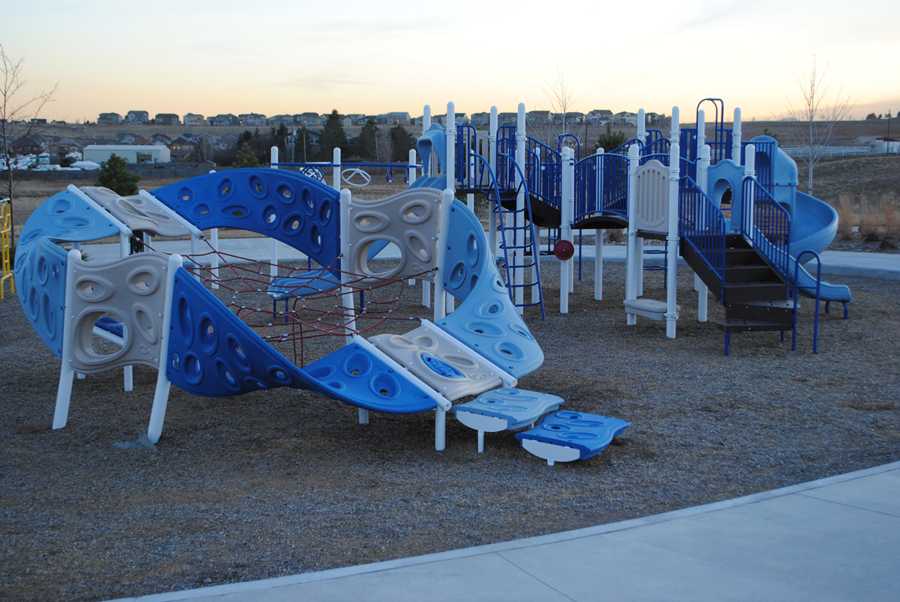Where are all the People?
Outdoor activities on the decline as internet, social media occupy free time
An empty playground in Whisper Creek is not an uncommon sight these days as more and more children and teens prefer to stay indoors.
December 12, 2014
There’s a new plague upon us.
Places in which children used to run around screaming are now silent.
So, where did they all go?
Why are the streets, the playgrounds and the parks void of pick-up basketball games and random games of tag?
“The indoors are just more comfortable for me. I still do things outdoors, but overall I just find it better to be inside.” says sophomore Jacob McKean. “The internet plays a huge role for me and most people.”
The recurring idea of the internet seems to be a common factor among teenagers at Ralston Valley.
“Kids prefer to be indoors,” said sophomore Jean McClelland. “The internet opens up a door, and people get lost inside.”
The idea of the internet is a perfect world.
We can get information at the push of a button.
We can instantly communicate with somebody around the world.
We can share with anybody what’s going on in our everyday lives with our friends on Facebook.
However, the internet is far from an idealistic world.
“The internet can be used in a bullying fashion,” said junior Heather Stehle. “The internet makes bullying a complicated business.”
It seems that we use technology for everything at any time of day, to keep us inside.
“We all became so attached with phones, and the internet,” sophomore Kristin Kembel said. “Teachers have to constantly tell us to put our phones down.”
One of the biggest hindrances that the internet puts on our lives is social media.
“I believe that social media could be a good thing,” said sophomore Allison Carr. “I mean, you get to share what you do in your everyday life with the people that you call friends. But you should know who’s following you.
“his could help the relationships that we have with people,” Carr added, “but instead it just makes things go backwards. It has evolved into something that has taken over our lives.”
It is not just these sites and the internet that keeps everybody indoors. It’s the work that we do, and the homework that we have.
“Homework plays the biggest role in staying indoors,” said Kembel. “You start falling behind, and it becomes as inescapable black hole.”
This ‘black hole’ doesn’t just happen to a few students; it happens to the majority.
“Whenever I try talking to someone, they tell me they have a lot of homework, and I shouldn’t distract them,” said sophomore David Cochran. “The homework plays a bigger role than tchnology (in keeping students indoors).”
Sometimes, even family relationships take a backseat to homework.
“There is so much homework that it gets to the point where I have to stay inside and cut ties to everyone, including my family,” said McClelland.
Homework consumes students’ lives in every way possible. This can be seen both positively and negatively.
On the plus side, homework doesn’t allow students to waste their lives on technology.
The negative? Teenage students are spending too much time inside, and still are largely dependent on technology to help them with the abundance of homework.
“I spend a significant amount of time on homework,” Carr said. “Spending time on the computer has made it easier to complete the homework. But it’s also to the point where it becomes your life.”
And when students finally have a moment to take a breath, they go back to their computers, not to the neighborhood park, not to play with their friends, and not to get any exercise.
“I would say that work, eat, sleep is true,” McKean said. “It’s very boring and dull. We try and escape through games and technology.”
For most, that is true. For others, well, at least a few see the benefits of getting outside.
“Personally,” said Carr, “I feel better after a walk.”
Perhaps the worst aspect about our technological reliance, are the hours of sleep lost each night.
“It definitely affects my sleep schedule,” Stehle said. “Kids today don’t go to bed without their phone on their hip or in their hand.”
“I’ll go to bed and play a game on my phone or watch a show,” Kembel admitted. “It just spirals out of control until it’s four in the morning. You have to put your phone down.”
“Personally,” said McKean, “I do not catch enough sleep.”
There are sites that pave the way for this, including YouTube, Twitter, Tumblr, Facebook, Netflix, Facebook, and Hulu Plus.
“If YouTube didn’t suggest videos,” Cochran said, “I’d get a couple years of my life back.”
So now, instead of calming down and perhaps reading before going to bed, students are overloading their brains with social media, video games and Television binging.
Goodnight, Moon, has been replaced by Goodnight, iPad.
“That makes me so sad,” Kembel said.


